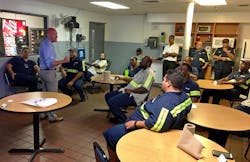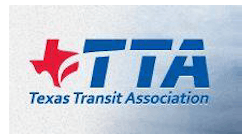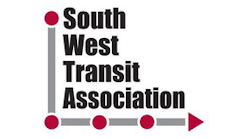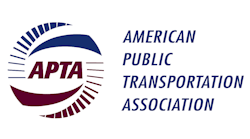With public transportation and its frontline employees being critical to the mobility of a community following a storm and emergency conditions, it’s important for employees to get their personal lives in order so they can focus on helping get the community back up to normalcy.
The recent hurricanes Harvey and Irma created varying levels of challenges for areas in the south and southeast. Several agencies impacted, share how they prepare their employees for extreme weather, how they help them recover.
Palm Tran Executive Director Clinton B. Forbes said as they start tracking the storm, they encourage employees to get their personal lives and homes in order well in advance. The county administrator has slated all county employees as essential. He said, “All of our employees, the 630 that we have, are essential personal.”
A Sense of Security
There was such a long span of time since a storm of similar proportion for LeeTran that LeeTran Deputy Director Fixed Route Paul Goyette said it was more challenging for their folks. Due to the magnitude of the storm, some of the employees were genuinely concerned for themselves.
Ensuring employees feel they’ll be OK and know their families are OK is important so they can focus on emergency response.
Hillsborough Area Regional Transit Authority Chief Executive Officer Katharine Eagan understood that first hand. The projection was a category 4 storm coming straight to Tampa. Her family didn’t have gas, they weren’t going anywhere, they weren’t getting out of the state, so she said they made the decision that her family would go to a hurricane shelter as she would go to the emergency operations center.
“As a mom, that was a horrible decision,” Eagan said. “But let me tell you, as soon as I knew my kids were safe, I could really focus on supporting our transportation.”
She also said it made a big difference to the community that when she would do briefings, she could tell people that her family had checked in to a shelter. Eagan said she heard back from so many people that their family didn’t want to go to a shelter, but then heard her family was there and knew it would be OK.
“I think the first briefing was held Sunday morning and I said something to my family at the end of it, looking at the cameras,” she said, “I’ll see you after the storm.”
To make sure employees take care of their families first and foremost, agencies provide awareness information, from reminding employees to put on their shutters, to talking about preparations for prolonged power outages, including stocking up on non-perishable food, ice, coolers, medications, and to pull out cash in case you are unable to use ATMs or credit cards.
South Florida Regional Transportation Authority/Tri-Rail Safety and Security Director Allen Yoder said they put out a long list of preparations far enough in advance. As it gets closer to the storm, Tri-Rail policy is service is suspended usually a day prior to the storm as they won’t take passengers to work in the morning if they can’t get them home in the evening. “So we’ll make a decision sometimes, it’s still calm outside,” he said. “The storm’s out there, but you don’t see the effects of it until later that day … our employees are released early so if they need to, they can take care of those things.”
Metropolitan Transit Authority of Harris County President & Chief Executive Officer Thomas C. Lambert said while they do hurricane planning every year, they remind their employees the steps to take care of their homes and families. “That’s all part of our thought processes before we ever get into an emergency.
“We remind people that they have to do emergency kits and take care of their families,” he stressed.
Communication is Key
Several agencies mentioned hotlines for employees. They’re kept up-to-date with the changing conditions and information that can get pushed out to employees. They are also kept informed on when they need to start coming back, as well, to being recovery operations.
Forbes said they have contracted with Everbridge, an emergency mass notification system. “It texts all of our employees and gives them immediate information on what we’re doing,” he said. “That worked very well for us.”
Employee Support and Recovery
Agencies have a variety of ways in helping their employees during and following an emergency.
Ashlie Handy, media liaison for Pinellas Suncoast Transit Authority, said they met with their CFO and she gave the OK to make sure all of its employees were paid early. With a lot of employees living paycheck to paycheck, it could be near the tail end of what was left.
Handy said, “It’s very stressful, especially if you want to get your family out, start buying supplies and you don’t have money to do that, so I think that was really amazing that we definitely thought about our employees first.
“We had our finance department stay here overnight to make sure every single person was going to get paid and had that money, had that security money to go and leave if they had to … they could make those decisions and take care of themselves before anything else.”
Employees were also told if they had to leave, to go ahead and do that, there were no repercussions for people that couldn’t show up.
At Metro in Houston, the board approved an opportunity that allowed employees to sell back a certain number of vacation time to give them some funds to help with recovery efforts. Employees could also donate vacation time to some of their colleagues that needed that time to recover. Lambert said, “We’re trying to do everything we can to be supportive of our colleagues that sustained damage and to help them get back to normalcy as fast as they can.
Several staff from LeeTran had major damage to their homes and some are still waiting for adjusters to come out or a contractor to come out. Goyette said, “If someone has a challenge at home or they can’t have a place to go back to … you’re making exceptions for those folks. We try to help them out in any way that we could so that they could continue to come to work to help the agency, to help the county get back on its feet.”
He said there are a lot of things to think about, besides just being the responder. “You can’t respond if you don’t have basic life needs: shelter, food, water. You have to think about that and be prepared for that at your agency and how you’re going to help out your people.”
Corpus Christi Regional Transportation Authority, Director of Marketing Kelly Coughlin said there were some employees who lost everything during the storm. “They have come through and they can conquer anything,” she said. She added, “We’ve been really inspired by the fact that, not only have our friends and family in this community come together, but our transit community has really reached out to us and these employees who lost everything. We’ve been really thankful for that. They’ve sent clothes, money, everything they could to make sure our employees could maintain well.”
Lambert agreed. “I really appreciate the South West Transit Association, the Texas Transit Association, the American Public Transportation Association and all the individuals and organizations that contributed … that went out to transit employees in Texas, Florida … and Puerto Rico.
“We had about 500 employees at Metro out of about 4,000 that sustained some degree of damage.” He stressed, “The efforts of APTA, SWTA and TTA to help support them, we are very, very thankful and appreciative of that.”
More on emergency preparedness, planning, recovery and response from the recent hurricanes coming in the December/January issue, online 12/12/17.




